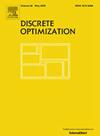Minimizing maximum dissatisfaction in the allocation of indivisible items under a common preference graph
IF 1.6
4区 数学
Q3 MATHEMATICS, APPLIED
引用次数: 0
Abstract
We consider the task of allocating indivisible items to agents, when the agents’ preferences over the items are identical. The preferences are captured by means of a directed acyclic graph, with vertices representing items and an edge , meaning that each of the agents prefers item over item . The dissatisfaction of an agent is measured by the number of items that the agent does not receive and for which it also does not receive any more preferred item. The aim is to allocate the items to the agents in a fair way, i.e., to minimize the maximum dissatisfaction among the agents. We study the status of computational complexity of that problem and establish the following dichotomy: the problem is NP-hard for the case of at least three agents, even on fairly restricted graphs, but polynomially solvable for two agents. We also provide several polynomial-time results with respect to different underlying graph structures, such as graphs of width at most two and tree-like structures such as stars and matchings. These findings are complemented with fixed parameter tractability results related to path modules and independent set modules. Techniques employed in the paper include bottleneck assignment problem, greedy algorithm, dynamic programming, maximum network flow, and integer linear programming.
在共同偏好图下对不可分割物品分配的最大不满最小化
我们考虑了当智能体对物品的偏好相同时,将不可分割物品分配给智能体的任务。偏好是通过有向无环图的方式捕获的,顶点表示项目和一条边(a,b),这意味着每个代理更喜欢项目a而不是项目b。代理的不满意程度是通过代理没有接收到的项目数量来衡量的,并且它也没有接收到更多的首选项目。目标是以公平的方式将项目分配给代理,即最小化代理之间的最大不满。我们研究了该问题的计算复杂度状态,并建立了以下二分法:该问题对于至少三个智能体的情况是np困难的,即使在相当有限的图上也是如此,但对于两个智能体是多项式可解的。我们还提供了几个关于不同底层图结构的多项式时间结果,例如宽度最多为2的图和树状结构(如星形和匹配)的图。这些发现补充了与路径模块和独立集模块相关的固定参数可跟踪性结果。本文采用的技术包括瓶颈分配问题、贪心算法、动态规划、最大网络流量和整数线性规划。
本文章由计算机程序翻译,如有差异,请以英文原文为准。
求助全文
约1分钟内获得全文
求助全文
来源期刊

Discrete Optimization
管理科学-应用数学
CiteScore
2.10
自引率
9.10%
发文量
30
审稿时长
>12 weeks
期刊介绍:
Discrete Optimization publishes research papers on the mathematical, computational and applied aspects of all areas of integer programming and combinatorial optimization. In addition to reports on mathematical results pertinent to discrete optimization, the journal welcomes submissions on algorithmic developments, computational experiments, and novel applications (in particular, large-scale and real-time applications). The journal also publishes clearly labelled surveys, reviews, short notes, and open problems. Manuscripts submitted for possible publication to Discrete Optimization should report on original research, should not have been previously published, and should not be under consideration for publication by any other journal.
 求助内容:
求助内容: 应助结果提醒方式:
应助结果提醒方式:


